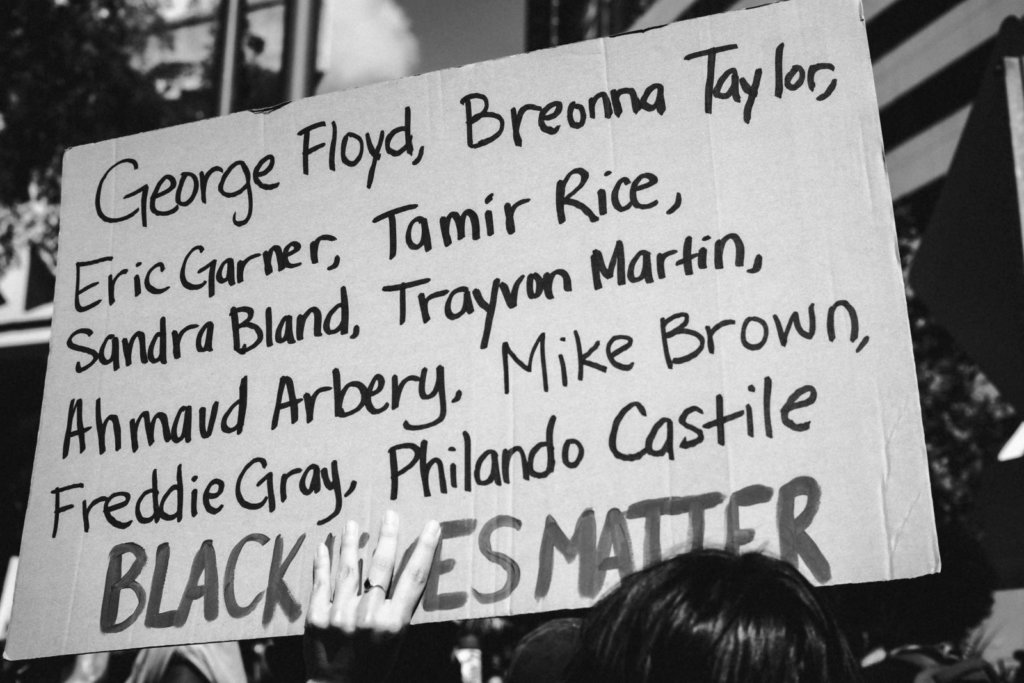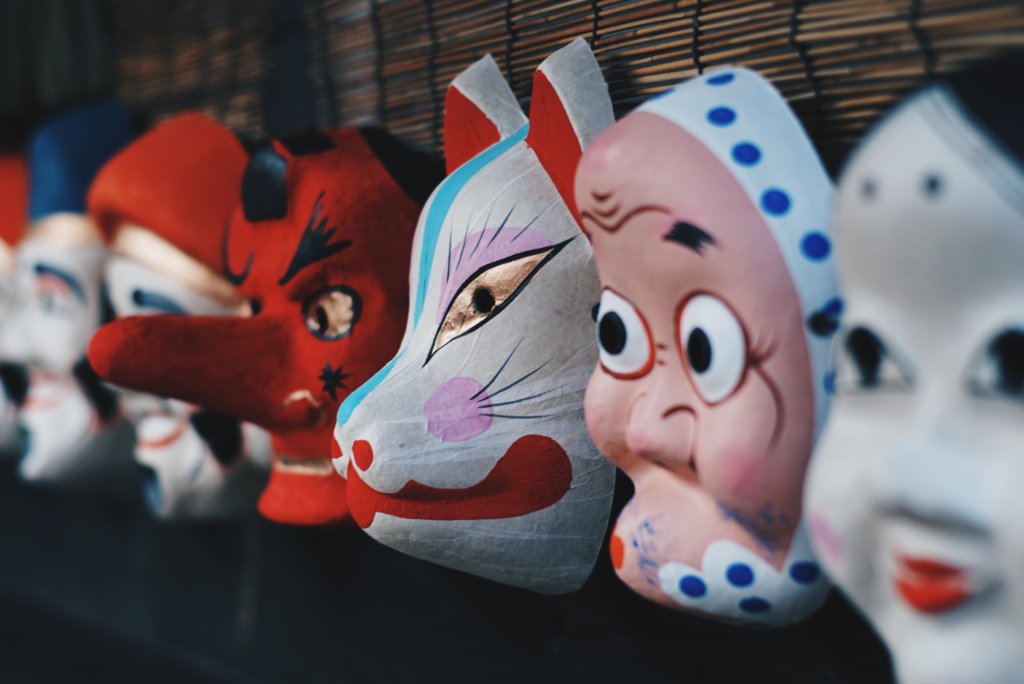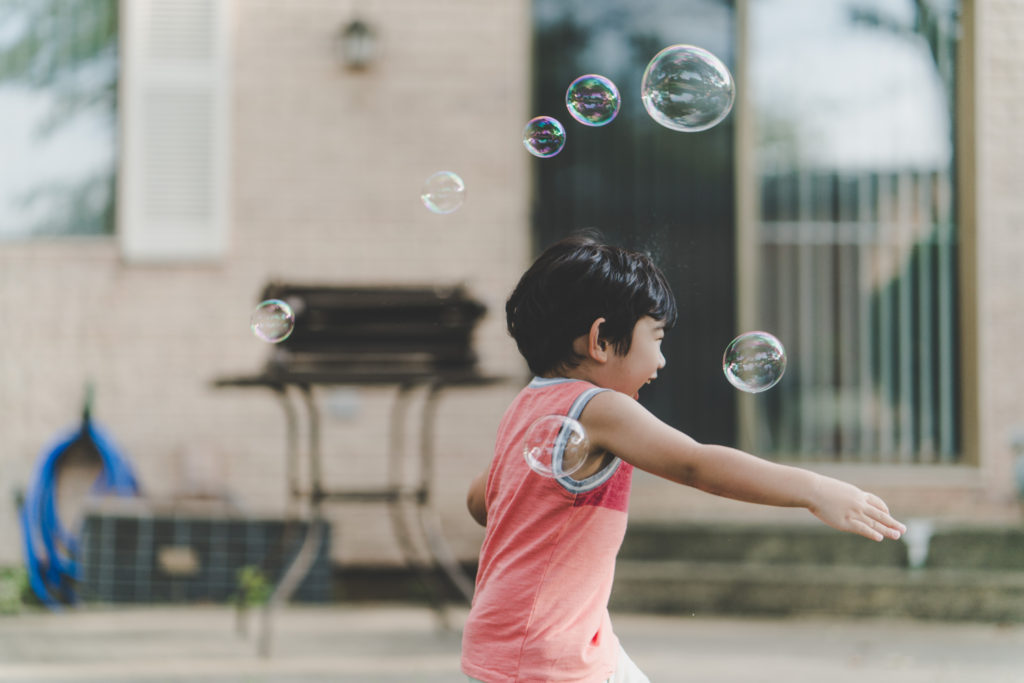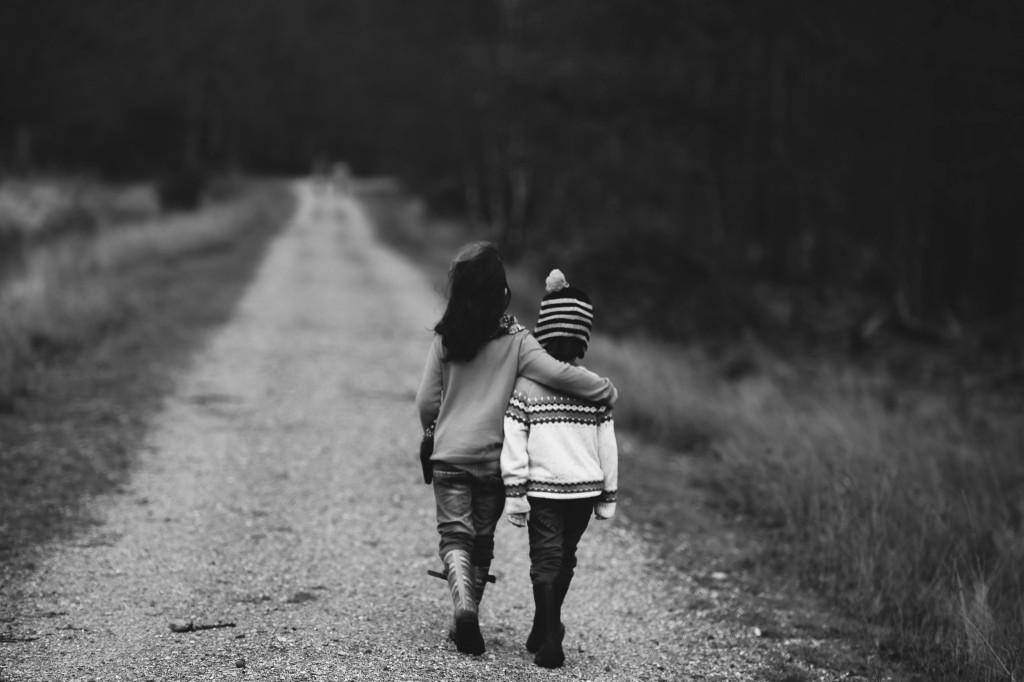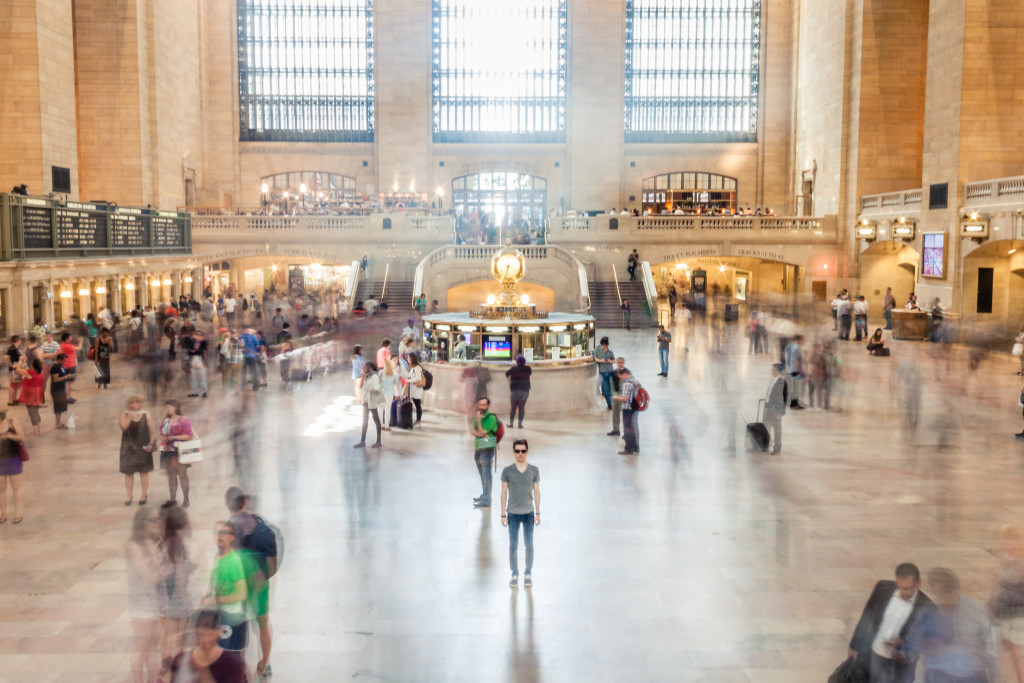On Saturday I sat in the backseat of a car with a moon roof. I stared up at the sky and noticed a rainbow hidden in the clouds. I lowered my sunglasses because usually, that helps me see colors better but, in this case, I was surprised. Leaving my sunglasses on helped me more clearly see the rainbow. It blew my mind a little, to be honest.
We talk a lot about darkness and associate it with bad or evil things. Darkness is something to be scared of, it’s dangerous. But is that always true? Seeing this rainbow through my sunglasses reminded me sometimes darkness is illuminating. That happened for me this week not only with a rainbow but also with a better understanding of trauma.
When I first heard the news about antisemitic banners hanging over an LA freeway, my response was, “Where will I run?” That’s not rational or reasonable. No one was chasing me! Furthermore, I’ve never directly experienced antisemitism – no one has called me names for wearing a Jewish star or bullied me online. So where did this response come from? It’s a bodily memory from my ancestors.
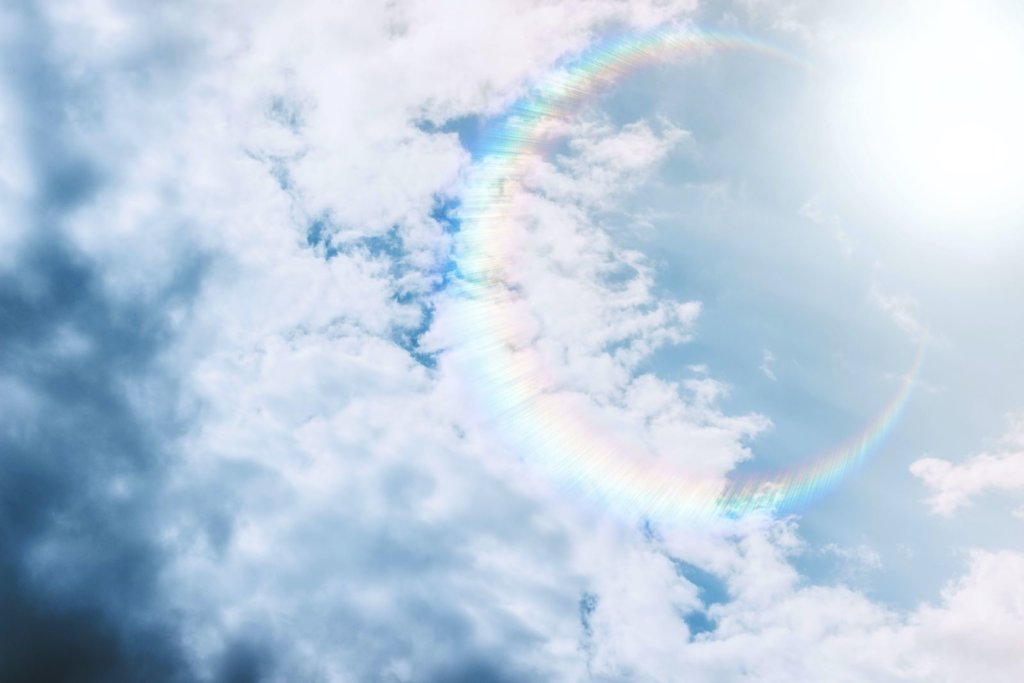
The rainbow I saw wasn’t nearly this defined but you get an idea of what I saw. Photo by Mathias Reding on Unsplash
My maternal ancestors lived in Eastern Europe and even before the Holocaust, it wasn’t free of antisemitism. I don’t know much about them, but I do know about my grandparents – both of whom were Holocaust survivors. They both had horrific experiences, but I think my, “Where will I run?” response comes from my grandmother.
During World War II, she dug her way through the ground floor of a Lithuanian ghetto and escaped via a sewer line into the woods. In other words, she ran. To my surprise, when I encounter antisemitism in places I don’t expect, like an LA freeway, that same response shows up in me. My “lizard brain” gets activated. We all have this brain, it’s our limbic system, and it doesn’t respond to logic or reason. The limbic system scans all sensory inputs and responds in a fraction of a second by letting them into the cortex, the thinking part of the brain, or initiating the fight, flight, freeze, or fawn response.
As trauma-therapist Resmaa Menakem writes in his book My Grandmother’s Hands, “This mechanism allows our lizard brain to override our thinking brain whenever it senses real or imagined danger. It blocks any information from reaching our thinking brain until after it has sent a message to fight, flee, or freeze.”
In other words, you can’t reason with your lizard brain. It just responds. What I hadn’t realized, and what I think many people also don’t understand, is that when it comes to big issues, the “isms” and “phobias” we’re facing right now, you can’t reason those away. It might work with some people to explain why racism is harmful to everybody, including white people, but if a white-bodied person feels fear or anger in their nervous system when they encounter a melanated body, logic goes out the window and racism continues.
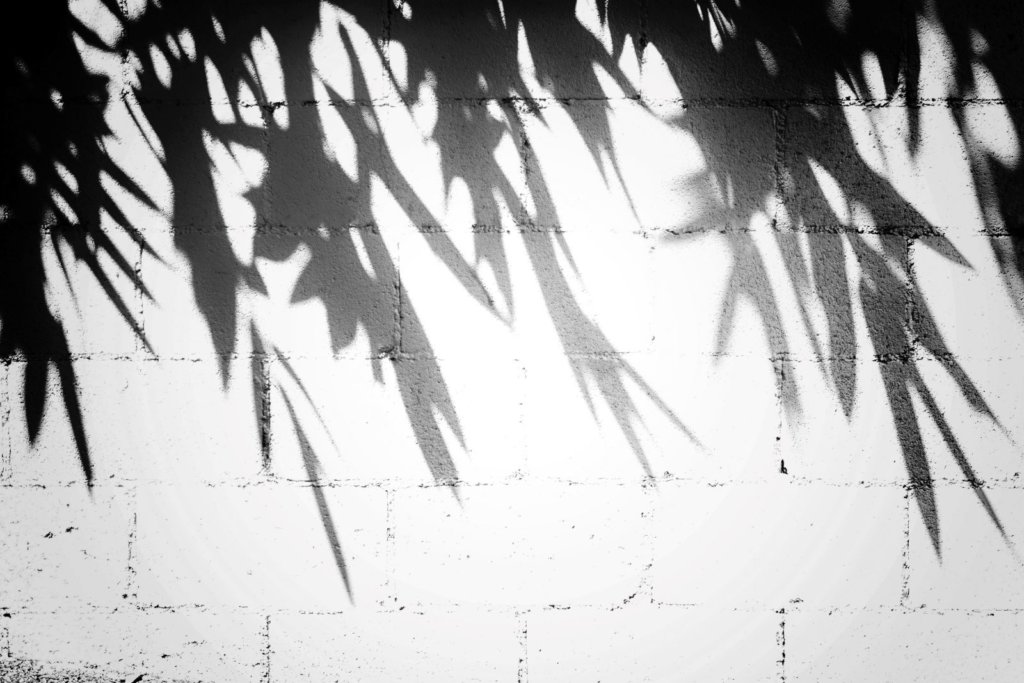
Shadows can offer a new perspective sometimes. Photo by Tim Mossholder on Unsplash
Similarly, emotional appeals will also only take you so far. Just after George Floyd’s murder, there was a surge of interest in antiracism. Emotions ran high and people purchased books and enrolled in classes more than they had before. But now, those classes and courses aren’t garnering as much interest or attention because emotion faded. But the body remembers. Menakem argues, “If we are to survive as a country, it is inside our bodies where this conflict will need to be resolved.”
After this week and experiencing my own version of alienation and othering, I agree. I can’t reason with people why antisemitic tropes are malarkey. I can’t emotionally convey why staying silent in the face of antisemitism is terrifying for me as a Jewish person. If you don’t get it, I can’t make you get it. What I can do though, is heal my own trauma.
When we do so we make room for growth in our nervous systems and that spreads. It’s like emotional contagion, but instead of emotion, something even more powerful. This isn’t a task relegated to oppressed groups, by the way. Every group has its own brand of trauma including white people. Responding with rage and aggression in the presence of an oppressed group is evidence of that.
Darkness revealed a lot to me this week. And not only a rainbow.
I dream of a world where we recognize logic and emotion only takes us so far. A world where we understand the power of trauma and create more space and peace within our nervous systems. A world where we confront our shadow to make the world a better place for ourselves and others. A world where we understand not only is light illuminating, so is the dark.
Another world is not only possible, it’s probable.
I feel unsettled after learning what happened to novelist Salman Rushdie on Friday. If you’re unaware, he was stabbed as he prepared to give a lecture in upstate New York. He suffered wounds to the neck and abdomen and is thankfully on the road to recovery, according to his agent.
It’s believed the attack is in connection to Rushdie’s late-80s book The Satanic Verses, which many Muslims consider blasphemous as it mocked or at least contained mocking references to the Prophet Muhammad and other aspects of Islam. There’s also a character based on the Supreme Leader of Iran and after it was published, Iranian leader Ayatollah Ruhollah Khomeini issued a fatwa, or edict, calling for Rushdie’s death.
I’m upset by multiple things. One, the stabbing occurred during a lecture, an event you would think was safe and peaceful. Two, multiple people were so enraged by words, not actions, words, they sought to kill someone. That’s pretty intense. And problematic because to quote Rushdie, “The moment you say that any idea system is sacred, whether it’s a religious belief system or a secular ideology, the moment you declare a set of ideas to be immune from criticism, satire, derision, or contempt, freedom of thought becomes impossible.”
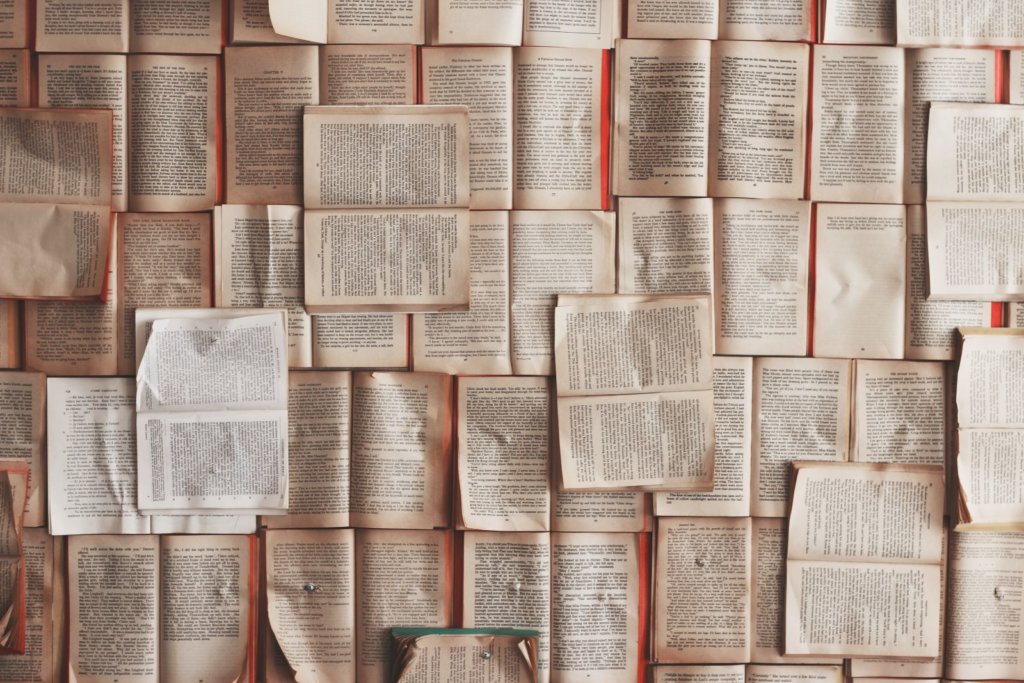
Critical thinking is key. Photo by Patrick Tomasso on Unsplash
Freedom of thought becomes impossible because instead, people sink into dogma. Dogma is thinking without logic or reasoning. And once a person does that, they start doing something because someone else told them to, which is dangerous because they can become easily manipulated by others. They fall prey to schemes and cause real harm to themselves and others.
Dogma can also be the reverse, by the way. It can be disregarding what a certain person, group, or organization says just because of their identity. My spiritual teacher says, “[D]ogma has had an extremely negative influence on ordinary people .… By arousing narrow sentiments, the adherents of dogma hope to fulfill their selfish aspirations … The followers of dogma do not want people to tread the path of rationality … The worst propounders of dogma – the kings of dogma – do not want people to develop mental clarity. They do not want the penetrating illumination of the sun’s light to pierce through the mists of dogma. They do not want people to bathe in the radiant light of the day and stand under the clear, unclouded sky.”
It’s also the case we fall prey to dogma internally, without someone acting as a puppeteer. We see this on social media with “stans,” or super fans that are overzealous and obsessive. They think the person they follow can do no wrong, and when the person inevitably makes a mistake, because, hi, they’re human, some stans dig their heels in and defend the person. People who aren’t super fans will engage in a takedown and explain why the person is trash and should be “canceled” or stop receiving support. From Merriam-Webster, “The reason for cancellation can vary, but it usually is due to the person in question having expressed an objectionable opinion, or having conducted themselves in a way that is unacceptable so that continuing to patronize that person’s work leaves a bitter taste.”
I understand that reaction and sometimes I think it’s warranted. However, this approach misses nuance. Every person is both a hero and a villain. Every person is capable of good and evil. It doesn’t make sense to follow a person as if they are an infallible, perfect human being. I know it’s funny to quote my spiritual teacher again here, but even he said, “Even if a young boy says something logical, it should be accepted, and if the Supreme Creator Brahma says something illogical, it should be rejected as rubbish.”
I agree. Use your brain. Dogma can be alluring because it’s easy and doesn’t require effort, but you have a brain and if you don’t use it, that’s not beneficial for anyone.
I dream of a world where we recognize no idea, person, or belief system is above scrutiny. A world where we don’t accept someone else’s words hook, line, and sinker, no matter who they are. A world where we use logic and reason to make the world a better place and bathe in the radiant light of the day.
Another world is not only possible, it’s probable.
As a highly sensitive person and an empath, I feel everything. Not only my own emotions, but other people’s too. If the folks around me are scared, I’m scared. If they’re sad, I’m sad. I’ve tried numerous ways of dealing with this high degree of empathy. When I was younger, I did my best to numb out, to not feel anything. Long story short, that was a disaster. As I’ve gotten older, I’ve tried all the other things: clearing, shielding, visualizing, smudging, etc.
Those methods work to a degree, but also, it’s exhausting to constantly feel like I have to protect myself from other people’s energy. This week my chiropractor said something to me, offered a suggestion, that has thus far made a world of difference. I spoke with her about joining a Zoom call organized by members of my spiritual community in Ukraine. They are holding a 24-hour kiirtan indefinitely to promote peace in the region. (Kiirtan is a type of spiritual singing, in case you’re unfamiliar with the term.)
As soon as I jumped on the Zoom call, despite feeling gleeful because I just received good news, I hooked in to the emotions of my spiritual family and they were not gleeful, rightly so. Instead, the energy of the collective – even though only one person was singing the same phrase in Sanskrit over and over again, or in other words not outright talking about the situation – was fearful and sad.
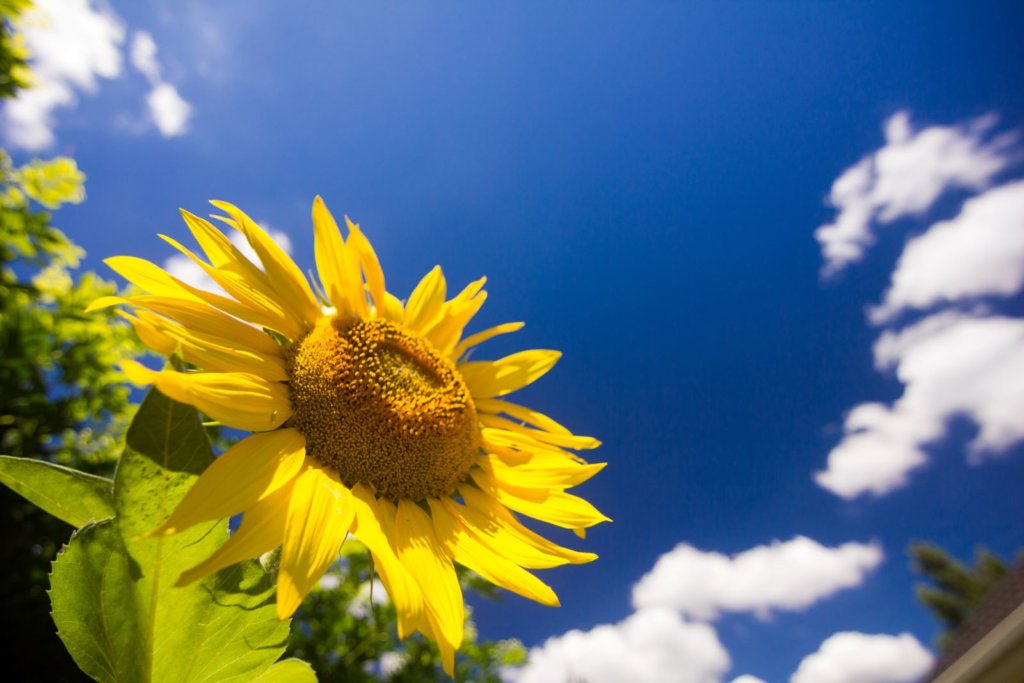
We can all be like this sunflower, absorbing energy and beaming it out. Photo by Tim Cooper on Unsplash
I told my chiropractor I don’t know how to separate myself from intense energy like that and she said, “I’m not sure you can.” It was the first time someone acknowledged that maybe all this clearing, shielding, visualization, etc. doesn’t work that well because we can’t separate from one another. We’re not supposed to because we’re interconnected.
I’m not a physicist, but it seems to me that’s what quantum entanglement is. According to Live Science, when two or more particles link up in a certain way, no matter how far apart they are in space, their states remain linked. They share a common, unified quantum state. Researchers found, “[I]f two particles are entangled, meaning their quantum states are strongly correlated and become unified, then measurements of one of the particles automatically influence the other, no matter how far away the particles are from each other.”
That certainly sounds like my experience of being on the Zoom call. I was influenced by people thousands of miles away. Instead of trying to separate myself from others, which is likely impossible, what if I used that connection? My chiropractor suggested I put one hand on my heart and raise the other hand in the air. To notice the peace in my own body because it’s true, I’m not fleeing a war zone, and imagine blue, healing light pouring down from the sky, into my body, and then out my upraised hand. In that way, I can be a channel, can transmit and participate with the energy that also exists in the world. There’s fear, but there’s also safety. There’s sadness, but there’s also joy.
Instead of getting swept away by someone else’s energy, what if I used the principles of emotional contagion to support people who need it? What if I transmitted my own feelings in an act of sponsorship to soothe others? As an empath, I often feel encroached upon, but what if I turned outward? What if I pushed out love and healing? I’ve been practicing this every day and I feel so much better. I’m beaming love to my siblings across the globe and donating to charitable organizations like Amurtel, run by people I personally know and trust. I’m using my gifts instead of being used by them and that changes everything.
I dream of a world where empaths no longer feel bombarded. A world where they use their connection with others to beam love, light, and healing to all who need it. A world where we understand we can’t withdraw from others and instead are inseparable, but that doesn’t have to be a bad thing. A world where empaths have tools to survive even when everything feels like too much.
Another world is not only possible, it’s probable.
The other week I saw a comment on a friend’s Facebook post that said certain people in the U.S. have a victim mentality and there are plenty of opportunities and resources to get ahead if they wanted. The comment has stuck with me like a burr in wool. I went to reply to the post and of course now I can’t find it so instead I’m writing a blogpost about it.
There’s a difference between a victim mentality and actually being a victim. For instance, in Pennsylvania, two separate studies found holding poverty as a constant, the Whiter the school district, the higher the funding. On average, the Whitest districts received thousands of dollars more than their fair share for each student, while the least White districts received thousands less for each student. Is that a “victim mentality” or actually being a victim?
In another example, four mothers are suing Jackson, Mississippi, because the school their kids attended lacked textbooks, basic supplies, experienced teachers, tutoring programs, after-school literary programs, and even toilet paper! Would you tell those children they should pull themselves up by their bootstraps and work even harder? Or maybe you’d advise a different approach and say those parents should have transferred their kids to another school, to do whatever it takes to give their kids a good education. A better question I think is why should the parents have to transfer their kids? What ever happened to the promise made to us by the state to provide a uniform system of free public schools?
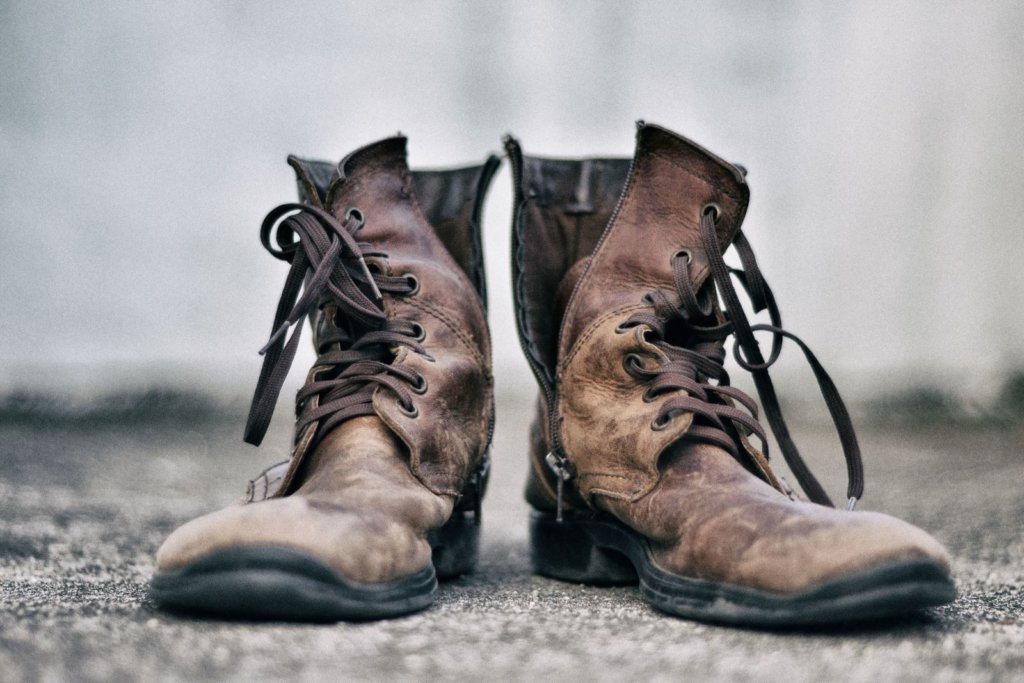
This picture makes sense if you think about the title of this post. Photo by Oziel Gómez on Unsplash
At this point some people may start talking about Darwin and survival of the fittest. How we’re playing out something inherent to human beings and our evolution. “Survival of the fittest” is an outdated idea that’s used to support callousness. The reality is we don’t live in a society where survival of the fittest operates. We have healthcare, we put curb cuts onto sidewalks to allow for wheelchair users and strollers, we have unemployment assistance. For the roughly 30 million Americans who are unemployed are we saying too bad, so sad but figure it out on your own? No. Because human beings are more compassionate than they are callous. We are more cooperative than competitive.
In fact, in 1965 when six Tongan boys were shipwrecked for 15 months they didn’t reenact Lord of the Flies – they worked together to help each other survive. That’s what human beings do. My spiritual teacher takes it a step further and says it’s our responsibility to take care of one another.
“You should always be vigilant that not a single individual of our collective body is in the least neglected or ignored,” he said. “Let not a single boy or girl feel within them that no one is concerned about them – let not a single person be allowed to think, ‘No one cares whether I have taken food or not.’ You must pay special heed to this. Particularly those of you who are in responsible positions of leadership should remember that … [Y]ou should always be concerned with others necessities, not your own. You should always think more about your duties and responsibilities than about your rights.”
Those are some strong words. I think there’s a balance because living in the society that we do, not everyone has this service mindset so it is important that I think of my own necessities otherwise I could go hungry. However, can you imagine what life would be like if we lived this way? If we felt responsible for other people in a non-codependent way? Sounds idyllic to me and exactly the sort of world I want to live in.
I dream of a world where we are concerned with others, not only ourselves. A world where every person feels cared for. A world where we feel responsible for each other. A world where every person is allowed to thrive because the collective supports them in doing so.
Another world is not only possible, it’s probable.
You know the saying, “History doesn’t repeat itself but it often rhymes”? I’m finding that to be true. We’re currently rhyming not only with the 1960s, but also the 1860s. That may sound strange for me to say. How is what the U.S. is going through now anything like the Civil War era?
I’d say we’re already engaged in another civil war, albeit nontraditionally. We don’t have troops marching against one another, but we’re already seeing a fight pitting brother against brother, sister against sister, and sibling against sibling for people who identify as nonbinary. We’re fighting online, in homes, on the streets. We’re fighting with words, and actions, and yes, also guns.
This civil war, like all civil wars, is a battle between the oppressed and the oppressor. For this civil war though, there are no discernible uniforms. It’s harder to identify who’s on what side. Amy Cooper, the woman who called the cops on Christian Cooper in New York City, identifies as a liberal. At least it seems that way given her campaign contributions. It’s not so easy to say Democrats are social justice warriors and Republicans only care about themselves. It’s also not so easy to say if you’re a person of color you’re automatically fighting for justice because one only has to look at the discriminatory policies Ben Carson supports in order to see that’s not true.
A key difference with this civil war though? There is no “North” to escape to. There is no place in the U.S. where people of color have true freedom. George Floyd was killed in Minnesota. So was Philando Castile. “Barbecue Becky” called police on black men barbecuing in my own state of California. These days we’re fighting for a metaphorical North. I say “we” because even though I’m not a person of color, I still have a stake in the game.
The Reverend Dr. Martin Luther King Jr. famously said, “No one is free until we’re all free.” I agree. My freedom, my ability to thrive in this world, is dependent on others being able to do the same. It’s part of why I mentioned in my last post that collective welfare is more important than individual welfare. We can relate that to this ongoing pandemic: If I contract COVID-19, I can spread it to other people. Your health is dependent on my health. That’s why we’re staying at home right now.
If you want another example, when more women work, economies grow, according to the United Nations. If female employment rates in more countries matched that of Sweden, it could boost gross domestic product by more than $6 trillion, the UN said. However, gender gaps cost the economy 15% of gross domestic product.
What would the world look like if people of color were allowed to thrive? What kind of contributions would they be able to make if they didn’t have to work so darn hard just to live? If they didn’t have to be in fear all the time? If they could operate in the world like, well, the average white person?
That’s the world I’m not only dreaming of, but fighting for. I’m not on the streets because my nervous system can’t handle it, but I’m contributing when, where, and how I can. And until that world exists, I’ll continue to fight for it and also dream of it.
I dream of a world where everyone is allowed to thrive no matter their race, ethnicity, gender, sexual orientation, or religion. A world where people can express the fullest, truest versions of themselves without fear. A world where we stand up for one another knowing we’re all interconnected.
Another world is not only possible, it’s probable.
One of the maladaptive ways I keep myself safe is through black and white thinking. When I meet someone, I make a snap judgment as to whether they’re nice or not and hold that image in my head like a painting. My opinion doesn’t change, even when their behavior starts to show the person isn’t nice.
Recently I met someone I perceived to be warm and easygoing. I put her in the “safe” category of people. I assumed she wouldn’t hurt me, that she’d respect me, and that I could interact with her without conflict. It turned out that wasn’t true. She flipped on me, showing a sharp side, a selfish side, an aggressive side. Her behavior shocked me for a variety of reasons, but one of the biggest is I didn’t pick up on this side of her personality at all when we first met. I started blaming myself for putting her in the wrong category, lamenting that I didn’t see this coming. How could I have been so wrong? I’ve had to remind myself people are complex and have different aspects of their personality. That not everyone is who they seem.
I read an Instagram post about a woman with an abusive ex-husband. She said people only see his charming side so it’s hard for them to believe he treated her poorly. We hear about that regularly, don’t we? How abusive people can be so loving, so charming, and so sweet. It’s confusing when they become violent, whether that’s emotionally, verbally, or physically. Where did this come from?
I’m reminded of the Dr. Jekyll and Mr. Hyde story, written in 1886, which endures because it speaks to a deep truth about human beings. We are all angels and demons. At any given point we could be a Dr. Jekyll or a Mr. Hyde. No one is static. No one remains immune to evil. Similarly, redemption is also possible for even the most hardened criminal.
My spiritual teacher says those two forces are constantly at work in the universe. We are in a ceaseless tug of war with both energies. We never have it made, so to speak, meaning life is about choices and in any given moment we can choose to behave poorly or not. It’s unrealistic to assume a person will stay the same because it’s the everyday choices that make up who we are, that change us. People either evolve or devolve, but they don’t stay still.
The world is not black and white, it’s in color. It’s complicated and nuanced and ever-changing. That means people are complicated, nuanced, and ever-changing as well. It’s hard to hold that mindset but it’s what will truly keep me safe because it keeps me grounded in reality and in the present.
I dream of a world where we recognize we each have the capacity for good and evil. A world where we remember people change all the time. A world where we realize it’s important to adjust our judgments of people when we are provided with evidence of their character.
Another world is not only possible, it’s probable.
As of right now, at least four of my friends are pregnant. Also, within the past two months, four of my friends have given birth. Birth happens every day, but to have so many people around me ushering forth new life fills me with hope and optimism, which is sorely needed right now.
Much of the news is gloom and doom, making it easy to believe the world is terrible and people are awful, but when I think of these new beings coming onto the planet, my heart swells. By and large, each generation is more progressive, tolerant, and accepting than the last. There are exceptions of course, but the majority are heading in that direction.
The other thing that fascinates me is contemplating the effect each new child will have on the world. We never know who the next Einstein will be. Even if the kid isn’t an incredible genius, each new child will likely contribute to the welfare of society, at least in my circle of friends. I base this on my observations of their parents: Awesome parents usually raise awesome children.
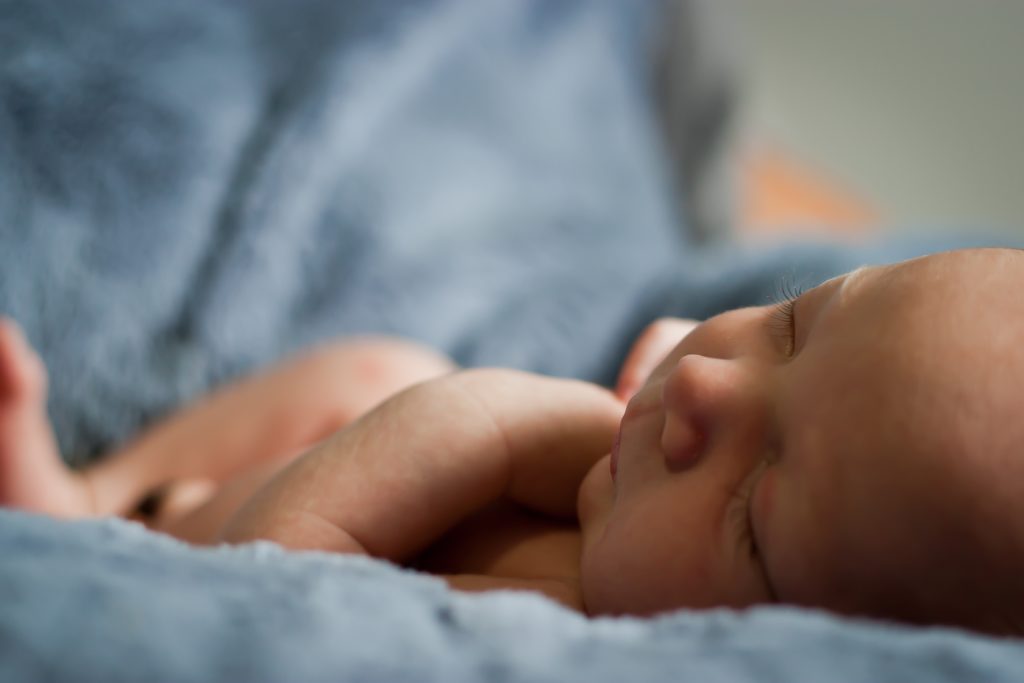
I have no idea who this kid is, but they’re adorable. Photo by Carlo Navarro on Unsplash.
This post is not a profound one, but rather a grateful one. When I look around me and see new children, I fully believe the world will become better and is becoming better. It’s much harder to dismantle prejudice, cruelty, intolerance, etc. in people who’ve had years of training to think in such a manner, and much easier to teach a new generation to love right off the bat.
A quote by Nelson Mandela comes to mind: “No one is born hating another person because of the color of his skin, or his background, or his religion. People must learn to hate, and if they can learn to hate, they can be taught to love, for love comes more naturally to the human heart than its opposite.”
Newborn babies can be taught to love, which is their natural inclination, and that means many of the problems we’re experiencing today will slowly fade into history. My spiritual teacher said:
All genuine spiritualists will have to adjust with the level of the dusty earth inspired by the spontaneous love of their hearts. They will have to share the wealth of their developed intellects with others to lighten the sorrows and sufferings of humanity. Through their guidance and leadership, human thinking will take a new turn and move along an entirely new path. The latent spiritual power in human beings will be awakened. Through their effort and inspiration, the new people of a new generation will be armed with a bold new optimism and vision of the future, and march forward triumphantly.
When I see babies, I see a bold and bright new future, a triumphant march forward, and that’s something to get excited about.
I dream of a world where we recognize the forward march that’s taking place. A world where we celebrate the new lives coming onto this planet who are surely ushering forth a bright future. A world where we remember intolerance and injustice will eventually die out.
Another world is not only possible, it’s probable.
The other day I had an interesting experience. Coming home from the city, I stepped into Walgreens and noticed a couple in front of me, primarily because the man had a huge, green backpacking backpack. The couple left and I didn’t think much of it until about half an hour later when I exited my station and I saw the same man! This is surprising because there are many trains and many stations he could have taken, but we ended up at the same one. Keep in mind, my station is a residential one – it’s not a popular destination.
If that wasn’t intriguing enough, the same day I sat next to someone at the train station and he too, got on my train and exited my station. When I noticed his presence as well as the man with the green backpack, all I could do was laugh. It reminded me that knowingly or unknowingly we are all moving together.
In Sanskrit there are several words to denote this concept, one of which is samáj, which means “society,” or a group of people who are moving happily and peacefully. In today’s world, this concept seems especially important to remember. Some people live in their own little bubble, thinking they are the only ones in existence. Other people are not thinking much about their actions and only looking out for themselves.
In the U.S. in particular we praise independence and rugged individualism. We’re in love with the myth of the self-made person, the lone wolf. We romanticize the notion of self-sufficiency, or at least that’s my perspective. However, I would challenge that notion. As I said to a friend the other day, it takes a village to raise a child, but I also think it takes a village to be a person. We’re not meant to do everything by ourselves, and why would we want to? Like it or not, we’re all in this together. Noticing those people on the train the other day reminds me we may think we’re our own little universe, but our universes are moving together. We are all on this big blue planet spinning through space.
My spiritual teacher says, “The proper thing is for all members of the society to move in unison; and while moving together, each member should feel a responsibility for every other member of society. Those who are unable to move must be carried so that the rhythm of the collective movement remains unbroken.”
I love this notion because we may pretend otherwise, but we are all dependent on each other and the world would be a better place if we all started acting like it.
I dream of a world where we realize we are all moving together. A world where we feel responsible for other members of our society. A world where we take care of not only ourselves, but each other.
Another world is not only possible, it’s probable.
Last week, I watched an inspirational movie about kids who utilized their talents to win scholarships to college and pull themselves out of poverty. All of the kids were the first in their families to go to college, and by doing so they become teachers, writers, policemen, etc. They weren’t forced to work in low-wage jobs like their parents were.
I teared up watching the flick – I love that they improved their lives – but then I got to thinking, “What about everyone else?” What about the kids who don’t have an exceptional talent that wins them a scholarship? These kids escaped the cycle of poverty, but someone else is waiting in the wings to take their place. Just because one person no longer has to pick oranges for a living doesn’t mean oranges stop getting picked. It doesn’t mean all the other orange pickers no longer have to endure poor working conditions and low wages.
The cycle of exploitation continues and our capitalistic economy feeds off it. In the case of food production, almost literally. Why is this? Because we continue to emphasis the rights of individuals (or corporations, who are now considered people) over the collective.
I’ve seen the individual versus the collective show up in a big way this week with the killing of Cecil the Lion. Minnesotan dentist Walter Palmer paid $50,000 to hunt Cecil the Lion, who was a big tourist attraction in Zimbabwe. Did Palmer think about anyone other than himself when he set out to kill Cecil? No he did not. He was prioritizing his own selfish interests.
Another way that the individual versus the collective is prioritized is the public’s reaction to the killing of Cecil. We’re directing so much ire against Palmer, but not talking as much about poaching laws in general. Outrage has reached such a fever pitch that Zimbabwe is calling for Palmer’s extradition and many people in the U.S. agree. I think part of the reason we’re seeing so much outrage over Cecil is it’s easy to excoriate an individual.
A few of my friends who are more focused on the collective have exclaimed they wish society would be as outraged over the killing of black people in our country as people are over the killing of Cecil. It’s harder to evoke as much outrage against a system, which is also harder to dismantle, than it is to get pissed off an at individual. Racism is so rampant, it’s seeped into many aspects of life, and how do you go about changing something like that?
I think it starts with prioritizing the collective. There is an African proverb that says, “If you want to go fast, go alone. If you want to go far, go together.” We are not going to go far if we keep focusing on ourselves alone. We are not going to solve any of our serious societal problems if we’re thinking, “How can I benefit?” instead of “How can we benefit?” Life can be better for all of us but that starts with striking a balance between the individual and the collective.
My spiritual teacher says, “One must not forget that collective welfare lies in individuals and individual welfare lies in collectivity. Without ensuring individual comforts through the proper provision of food, light, air, accommodation, and medical treatment, the welfare of the collective body can never be achieved. One will have to promote individual welfare motivated by the spirit of promoting collective welfare.”
I dream of a world where we go far, together. A world where we prioritize taking care of each other. A world where we understand what’s good for the collective is also good for the individual. A world where we work to raise each other up, and improve life for us all, because after all, you plus me equals we.
Another world is not only possible, it’s probable.
